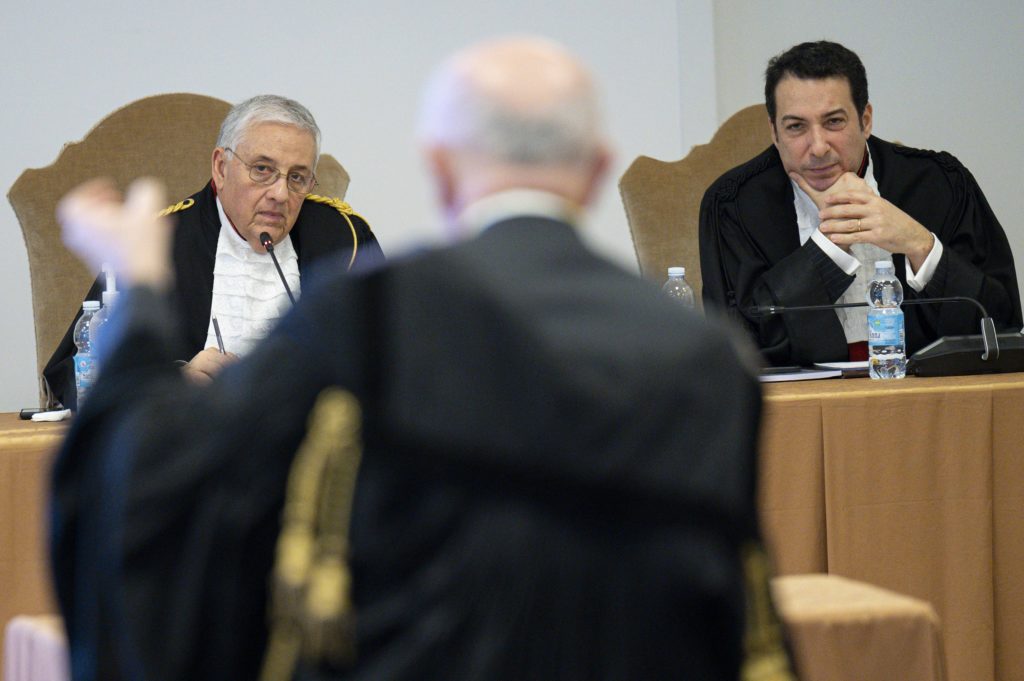A Vatican court rejected defense lawyers' request to dismiss charges against 10 defendants, including Cardinal Angelo Becciu, after prosecutors said the Vatican lost millions of euros in a controversial property deal that is at the heart of a massive Vatican trial for financial malfeasance.
Reading a 40-page court order March 1, Giuseppe Pignatone, president of the Vatican City State criminal court, rejected the motions defense lawyers had made over the previous seven months calling for the charges against their clients to be dismissed and complaining about procedures used in investigating and charging their clients.
The decision came one day after Alessandro Diddi, the Vatican's deputy prosecutor, told the court that the Vatican lost an estimated 217 million euros ($242 million) in a controversial property development deal involving a building on Sloane Avenue in London's posh Chelsea district.
According to the indictment released by the Vatican in July, prosecutors said their investigation "brought to light a vast network of relationships with financial market operators that have generated substantial losses for the Vatican finances, also drawing from resources destined for the personal charitable works of the Holy Father."
At the time of the property deal, then-Archbishop Becciu served as "sostituto," the No. 3 position in the Vatican Secretariat of State.
Pignatone also announced that Cardinal Becciu will be the first defendant to take the stand March 17 when the trial resumes. The Italian cardinal, who is accused of embezzlement, will be questioned about his alleged involvement in misappropriating Vatican funds and redirecting them to Spes, a Caritas organization run by his brother, Tonino Becciu, in his home Diocese of Ozieri, Sardinia.
"Finally, the time has come for the truth. Good!" Cardinal Becciu told journalists after the hearing. "I have been waiting for seven months and now I can speak."
During the hearing, Fiorino Ruggio, a lawyer representing Cecilia Marogna, who is charged with embezzling money through a humanitarian organization she ran in Slovenia, argued that alleged confidentiality agreements with the Vatican Secretary of State, the Italian government and NATO would impede Marogna from testifying in court. Marogna is an Italian political analyst who allegedly was hired as a consultant by Cardinal Becciu.
Pignatone said that while the court can request a clarification from the Vatican Secretariat of State regarding Marogna's alleged confidentiality agreement, it will not make the request to NATO because "they have other things to think about," apparently referring to the current crisis in Ukraine.
At the trial Feb.28, lawyers for some of the 10 defendants presented their arguments for why the charges against their respective clients should be dismissed.
Diddi, responding for the Vatican, drew the ire of several defense lawyers after he said their requests to dismiss the charges were an attempt to exploit the trial "to divert attention from the merits of the issues."
Cataldo Intrieri, a lawyer representing Fabrizio Tirabassi, a former official at the Secretariat of State who faces charges of corruption, extortion, embezzlement, fraud and abuse of office, said Diddi's assessment was "an insult to the defense."
Pignatone intervened, telling lawyers to "not react to insults" and to "stick to the facts."
Diddi also dismissed arguments made by defense lawyers who accused prosecutors of not sharing all the evidence collected during their investigation. Their arguments, he said, "were a tempest in a teapot," and that evidence as well as digital versions of documents related to the case "were available to all."
"Unfortunately, only the civil parties came to get them," Diddi said, referring to the Institute for the Works of Religion, commonly known as the Vatican Bank, as well as the Vatican's Financial Information and Supervision Authority and the Administration of the Patrimony of the Apostolic See. Lawyers for the three Vatican offices also addressed the court Feb. 28, explaining how the financial malfeasance damaged their offices and insisting they had a right to be civil parties to the case.

